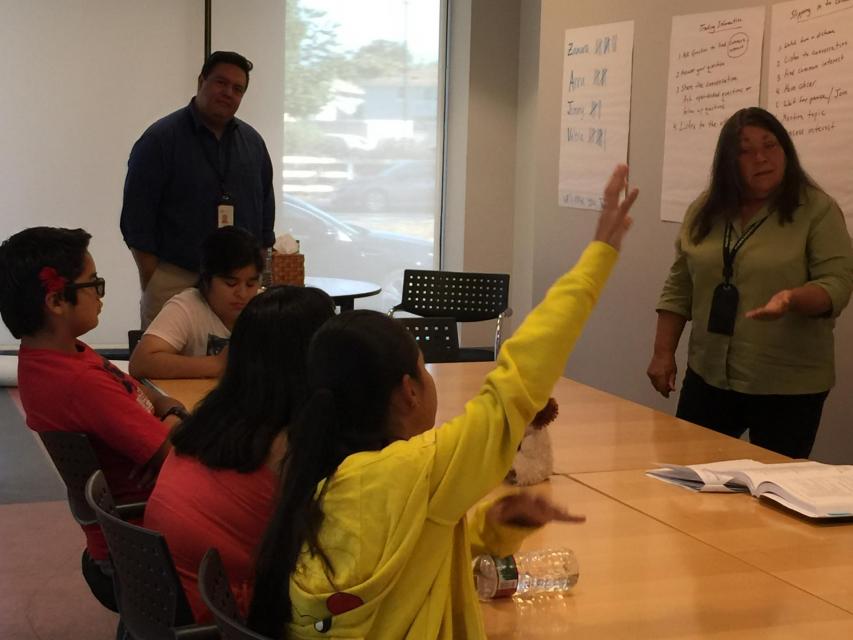
Harbor Regional Center’s clinical team of Board Certified
Behavior Analysts (BCBAs) offer classes on a wide variety of
topics to individuals served and their families across age and
diagnosis.
Please contact your Harbor Regional Center Service
Coordinator if you are interested in attending classes and
workshops.
Behavior Services and Supports
Orientation to Behavior Services
Audience: HRC Caregivers
Length: One two-hour session
Topics:
-
How and why Regional Centers and insurance fund for
behavior services, including Applied Behavior Analysis
(ABA)
-
HRC classes and workshops taught by
BCBAs
-
Additional HRC services and supports
Please contact your HRC Service Coordinator to
register.
Understanding Behavior
Audience: HRC Caregivers
Length: This class meets for two hours, once a week, for
six consecutive weeks
Topics:
-
Why behaviors occur
-
How to respond when behaviors
occur
-
How to prevent behaviors from
occurring
Please contact your HRC Service Coordinator to
register.
Self-Care and Social Skills
Toilet Training for All Ages
Audience: HRC Caregivers
Length: One two-hour session
Topics:
-
Individual/caregiver readiness for toilet
training
-
Preparing the environment to increase
success
-
Common barriers to successful toilet
training
Please contact your HRC Service Coordinator to
register.
Increasing Independence
Audience: HRC Caregivers
Length: One two-hour session
Topics:
-
Different types of prompts
-
Strategies to minimize prompt dependency and increase
independence
-
How to apply strategies across different
skills
Please contact your HRC Service Coordinator to
register.
Promoting Social Interactions
Audience: HRC Caregivers
Length: One two-hour session
Topics:
-
Information on social development
-
How to foster social interactions
-
Information on HRC-funded social skills
groups
Please contact your HRC Service Coordinator to
register.
Understanding ABA Reports
Audience: HRC Caregivers
Length: One two-hour session
Topics:
-
Components of Functional Behavior Assessments
(FBA)
-
Components of behavior plans
-
Importance of caregiver participation
Please contact your HRC Service Coordinator to
register.
Using Visual Supports
Audience: HRC Caregivers
Length: One two-hour session
Topics:
- Benefits and examples of visual supports
- Creating visual supports
- Implementing visual supports
Please contact your HRC Service Coordinator to register.
Boundaries, Puberty, Sexual Health and Safety
Puberty Talk
Audience: HRC Individuals Served between the
ages of 10 – 13
Length: One mandatory caregiver session followed
by six weekly two-hour sessions
Topics:
- Boundaries and consent
- Puberty and anatomy
- Optional activities for caregiver and child
Please note that, due to the child’s participation, caregivers
are required to attend Orientation to Puberty Talk and provide
consent for their child to attend.
Please contact your HRC Service Coordinator to register.
Teen Talk
Audience: HRC Individuals Served between the
ages of 14 – 17
Length: One mandatory caregiver session followed
by six weekly two-hour sessions
Topics:
- Boundaries and consent
- Anatomy and body image
- Sexual safety and decision making
Please note that, due to the child’s participation, caregivers
are required to attend Orientation to Teen Talk and provide
consent for their child to attend.
Please contact your HRC Service Coordinator to
register.
Elevatus Sexual Education
Audience: HRC Individuals Served age 18 and
older
Length: One orientation session followed by six
weekly two-hour sessions
Topics:
- Boundaries and consent
- Anatomy and identity
- Sexual safety and decision making
Please note that individuals served are requested to attend
Orientation to Elevatus Sexual Education and provide consent to
attend.
Please contact your HRC Service Coordinator to register.
Talking With Your Kids About Sexuality
Audience: HRC Caregivers
Length: One two-hour session
Topics:
- Examining barriers to talking about sexuality
- Exploring how to express your values
- Discussing ideas about disability and sexual
health
Please contact your HRC Service Coordinator to register.